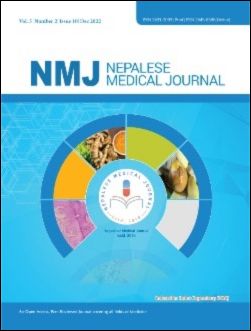A Rare Case of Shared Delusion of Pregnancy in a Couple Undergoing Fertility Treatment
DOI:
https://doi.org/10.3126/nmj.v5i2.43498Keywords:
Phangtom pregnancy; PseudocyesisAbstract
Pseudocyesis or phantom pregnancy is a false belief of being pregnant that is associated with objective signs and reported symptoms of pregnancy, which may include abdominal enlargement, reduced menstrual flow, amenorrhea, subjective sensation of fetal movement, nausea, breast engorgement and secretions, and labor. Though it is a very rare condition, it is often seen in women undergoing fertility treatment in developing countries. Isolated pseudocyesis in women and sometimes men have been reported before, but there are very few reports of shared delusions of pregnancy by a couple. No such report has ever been made before from Nepal. Therefore, this case report seeks to associate psychiatric/psychological, gynecological, and neuroendocrine mechanisms leading to the emergence of shared delusion of pregnancy (folie à deux) in a Nepali couple undergoing artificial reproductive techniques for the management of infertility. In this case, the couple firmly believed in their pregnancy against all medical evidence.
Downloads
Downloads
Published
How to Cite
Issue
Section
License
Copyright (c) 2022 Anzu Giri, Swati Kumari, Pawan Karki

This work is licensed under a Creative Commons Attribution 4.0 International License.
This license enables reusers to distribute, remix, adapt, and build upon the material in any medium or format, so long as attribution is given to the creator. The license allows for commercial use.
Copyright on any article published by Nepalese Medical Journal is retained by the author(s).
Authors grant Nepalese Medical Journal a license to publish the article and identify itself as the original publisher.
Authors also grant any third party the right to use the article freely as long as its integrity is maintained and its original authors, citation details and publisher are identified.




